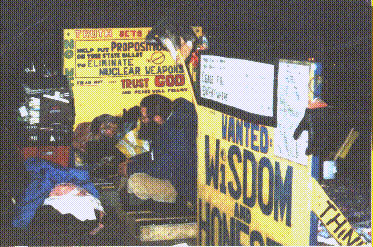THE GULF WAR
The War's Other Front
Through Middle America, Along Route 50,
The Conflict's Impact is DeepUS NEWS & WORLD REPORT February 4, 1991

Washington, D.C.
Ellen Thomas, bundled against the Sunday morning chill and pounding an Indian drum within earshot of the White House, doesn't look like a Navy mom. But she is. "My daughter Katie is on a ship in dry dock," she reports. "She's not in the Persian Gulf, but she could go at any time."
What is a pacifist's daughter doing in the military? "Education," Katie's mother responds. "In this country. if you don't have money, the only way to get a higher education is to go into the service."
Thomas, former homemaker and ex-businessperson, has spent the days and nights of seven of her 44 years in Lafayette Park, across from the president's house. She will keep demonstrating, she says, until the nation scraps its nuclear weapons and spends the money on housing, health care and education.
Three days before the war started, the drums began. Once bombs fell on Iraq, the drumbeat became a 24-hour affair. "I hear that George Bush hears the drums and is disturbed," Thomas says. "I hope he gets the message. If you are killing, you are against God."
U.S. News & World Report, February 4, 1991

